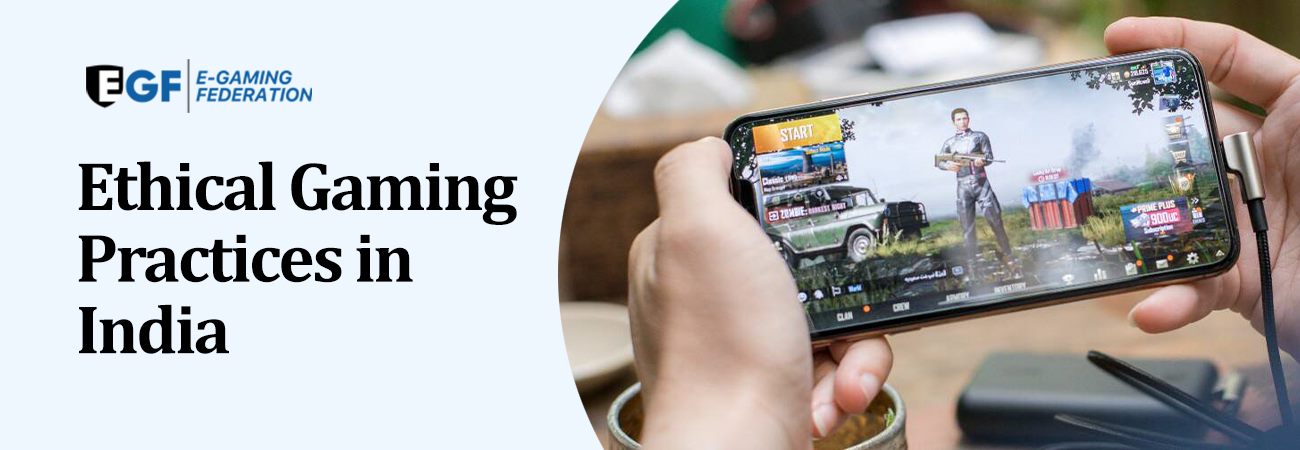


Online gaming is a rapidly growing sector in India, with millions of gamers enjoying a variety of game genres, particularly on mobile devices. As with any other activity, it is essential to be familiar with the surrounding ethical principles, which should eventually become an integral part of the gaming ecosystem. This ensures a fair experience for everyone.
Ethical & Responsible Gaming practices include being aware of and complying with applicable legal practices, respecting gaming regulations, having a polite demeanour, protecting player privacy, and refraining from engaging in harassing or toxic behaviour that could be viewed as unethical.
Ethical Gaming refers to the principles and practices that govern the development, promotion, and play of games in an honest and responsible manner. This ensures that games are made and played in a manner that respects the rights and well-being of players. The underlying tenet of Ethical Gaming practices should be that games and related services are pleasant, fair, and safe for all players and offer them an inclusively engaging experience.
This moral standard assures that games promote fair play and respect for others in the gaming community, as well as prohibit cheating and other forms of misconduct. Ethical Gaming plays a crucial role in preserving the integrity and reputation of the business, as well as providing a positive experience for all players. Online games should follow a well-thought-out code of conduct for Ethical Gaming.
E-Gaming Federation (EGF) is an independent, non-profit organisation that protects the rights of players. It was founded with the purpose of protecting user interests by establishing regulatory standards for the online gaming sector. It also assures that operators adhere to ethical and responsible gaming standards.
As the Indian gaming industry has rapidly grown in the last few years, regulations have become necessary as concerns of addiction and financial stress have increased. In light of this, EGF rules that players under the age of 18 are not allowed to play any skill-based, real-money online games.
In addition to including an age limit of 18 or older in the platform's terms and conditions, gaming operators must conduct a thorough screening of users by adhering to strict KYC standards during onboarding.
EGF further instructs gaming companies never to lure minors with ambiguous marketing or other promotional materials.
In the case of real money games, gaming operators must offer a clear notification at the moment of a player's registration that the user confirms he is at least 18 years old.
In the framework of Ethical Gaming practices, player safety is of the utmost significance. Ensuring the safety of gamers as they play games leads to a positive and enjoyable gaming experience. It is essential for game developers and publishers to prioritise the safety of their players in the design and operation of their games, and to take the necessary precautions to mitigate any risks.
It is critical to establish the users' data privacy and protection in Online Games, as game producers store personal details of players to design an enjoyable gaming experience. Game makers must govern games in a way that respects users' privacy, especially when it comes to sensitive data.
Maintaining the privacy of players' data should be a high priority, and gaming operators should strive to maintain appropriate administrative, technical, and security measures to protect players' personal information from loss, theft, and unauthorised uses or alterations.
It is important for players to be conscious of their safety while gaming and to take proper actions to protect themselves, such as taking breaks to avoid exhaustion or eyestrain and setting time restrictions. Too much gaming time can be harmful to a player's physical health, emotional health, relationships, and other responsibilities.
In the case of skill-based online money games, the EGF (E- Gaming Federation) requires gaming operators to provide players with the option of self-exclusion. Self-exclusion is an important step toward ethical and responsible gaming.
Gaming operators may make best efforts to identify players who may be addicted to playing skill-based real money games online and approach them to see if they need to stop playing and seek guidance on how to stop.
Game developers should provide inclusive and accessible games for all players, regardless of gender, religion, nationality, or sexual orientation. It is critical to be inclusive and appreciative of the gaming community's diversity. This involves refraining from acting in ways that could be viewed as biased or prejudiced. In accordance with the code and ethics, players must be aware that there are other people on the other side of the screen, and they must treat them with respect and kindness. This includes refraining from harmful or abusive behaviour against others.
Dark and misleading patterns (i.e., purposely curated designs with deceitful functionality that is not in the best interests of players) should not be promoted by game developers.
Any real money game and its core framework should be considerate of the players' time, well-being, and financial resources. In the gaming world, players are moral torchbearers, and their activities should emanate morality.
Cheating in games, whether online or in person, is immoral. In the context of gaming, "cheating" or "exploiting" usually refers to gaining an unfair edge over other players by exploiting a flaw, glitch, or other unlawful feature.
This could be as easy as finding a means to navigate through the game or as complex as using a precise sequence of actions to circumvent a game's mechanics and win more quickly. Cheating is against competitive gaming rules, and players who are detected as cheaters should be banned to ensure Ethical Gaming practices.
It is critical that minors (players under the age of 18) only play games that are appropriate for their age and maturity level as determined by the game creator. Game developers should incorporate a game rating system as well as monitor minors' (if permitted) gaming activities.
Minors' safety in the game's social setting must be prioritised by implementing safeguards to prevent negativity and report those who bully, harass and abuse.
Harassing or bullying other players, whether online or in person, is never appropriate. Harassment in online gaming can be defined as the use of the platform to threaten, intimidate, or shame an individual or a group of players. Harassment methods include, but are not limited to, insults, stalking, stealing resources in real money games, abusive communications, and doxing (publishing private or identifying information about players on the web).
Online harassment could be defined as persistent targeted attacks with the purpose to cause discomfort or harm, and it can range in severity from annoyance to dangerous or illegal behaviour.
This includes using hate speech or acting in a way that is intended to harass or hurt other players.
Gaming companies must not use marketing campaigns or other promotions to psychologically influence players to make excessive purchases. For this, online gaming platforms must also have features that allow them to keep track of their players' spending habits and limit the spending on purchases made by players.
Spending limits can make a significant difference in players' sentiments toward responsible gaming and allow for the long-term viability of the gaming ecosystem.
Sharing accounts with others is often viewed as unethical, as it can result in problems such as stolen items or compromised security. Similarly, it is deemed unethical to create multiple accounts in games to obtain an unfair advantage over other players or manipulate the game.
Gaming companies can stop users from sharing and making more than one account by using cookies or fingerprinting to create a unique identifier that links login and account creation attempts across sessions.
When it comes to gaming in India, the aforementioned are significant Ethical & Responsible Gaming practices. To maintain an Ethical Gaming environment, gaming operators and players must adhere to these fundamentals. These practices include respecting the rules of the game, protecting the privacy of others, and not engaging in any unpleasant or disruptive behaviour.
It is important to contribute to a fair and ethical gaming experience by being a responsible member of the gaming community.